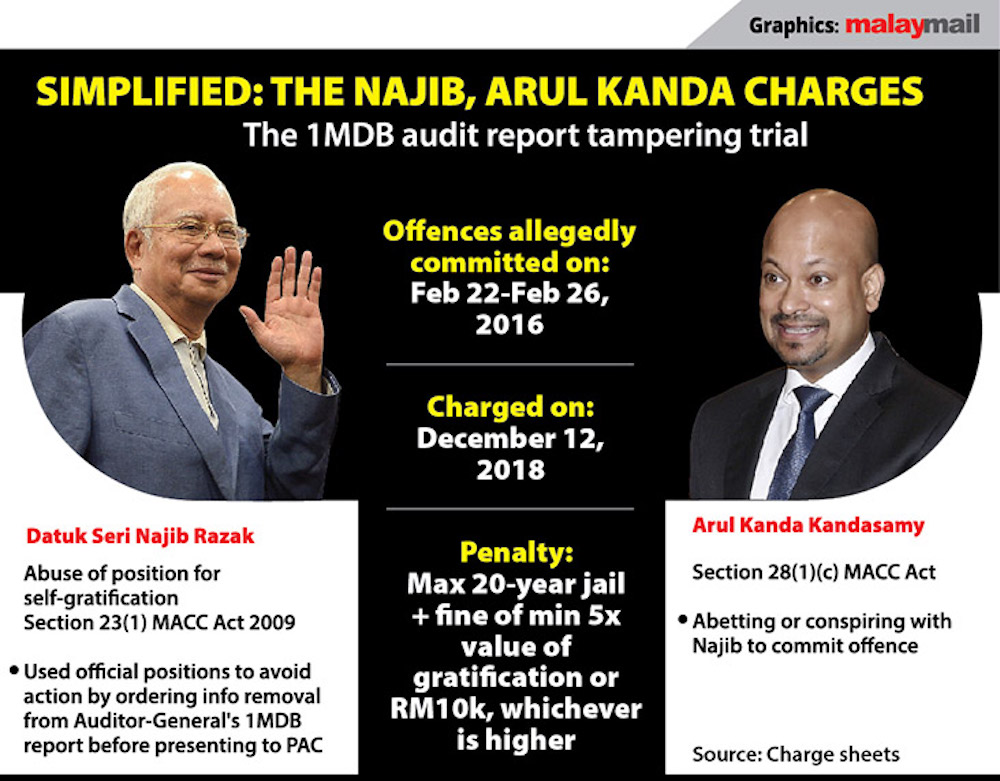Lead prosecutor Datuk Seri Gopal Sri Ram is pictured at the Kuala Lumpur High Court September 12, 2022. — Picture by Hari Anggara
Follow us on Instagram, subscribe to our Telegram channel and browser alerts for the latest news you need to know.
KUALA LUMPUR, Nov 15 — Former prime minister Datuk Seri Najib Razak misused his power to stop the “truth” about 1Malaysia Development Berhad (1MDB) from being given to the parliamentary watchdog Public Accounts Committee (PAC), by giving instructions in February 2016 which ultimately resulted in the Auditor-General’s audit report on 1MDB being changed before it could reach the PAC, prosecutor Datuk Seri Gopal Sri Ram argued today.
Sri Ram, who is leading the prosecution against Najib in the latter’s corruption trial over the alleged power abuse charge, said the prosecution has managed to prove all the elements of the charge against Najib that would require him to enter his defence.
“In a case where the accused is extremely intelligent and extremely corrupt, it puts the prosecution to great difficulty to unravel the mental element, not easy. It’s very difficult to prove because independent witnesses are very difficult to obtain in corruption cases. Nevertheless, we have produced sufficient evidence to establish each of the ingredients,” he said.
Sri Ram said the prosecution had showed evidence which proved that Najib had asked to view the 1MDB audit report before telling senior civil servants that he did not want certain matters to be included in the report, asking: “What business of it was his to send for the audit report?”
Sri Ram said the late chief secretary to the government Tan Sri Ali Hamsa had confirmed that the February 24, 2016 meeting — between the auditor-general, senior civil servants and 1MDB’s then CEO Arul Kanda Kandasamy which resulted in major changes to the 1MDB audit report — would not have happened without Najib’s instructions.
Sri Ram said all the circumstantial evidence and Najib’s conduct in February 2016 would all point to the conclusion “that he was doing something the law did not permit him to do and he did it in order to escape liability”.
Sri Ram also cited Ali Hamsa’s evidence that Najib had looked “upset”, and went on to suggest: “Why was he upset? Because he had the report in front of him which would expose him and his connection with Jho Low and his connection with having run this company the way it was.”
Sri Ram also cited evidence of how Najib had called Low Taek Jho’s mobile phone which was then passed to 1MDB’s former chairman Tan Sri Mohd Bakke Salleh instead of directly calling Bakke when the then PM had Bakke’s number, saying that these are circumstances which fortify the conclusion that Najib “was actually running the affairs of 1MDB.”
Among other things, Sri Ram said there was evidence indicating that Najib was a “shadow director” of 1MDB and taking interest in the management of the company by having had meetings with 1MDB officials.
Urging the High Court to look at Najib’s conduct from beginning to the end to determine his corrupt intention, Sri Ram said the evidence shows the inference that Najib had a direct or indirect interest in 1MDB and his objective was “to prevent the PAC from having the truth before it” to avoid criminal or civil legal action against him.
“Here we know for a fact that if P81 (the unamended 1MDB audit report) had gone to the PAC, there was a high probability, if not a definite conclusion, that the accused would be made liable because he had control over 1MDB,” Sri Ram said, referring to Najib as the accused.
Commenting on the level of participation that Najib had allegedly took to prevent the original and unamended 1MDB audit report from going to the PAC, Sri Ram questioned such alleged actions.
“At the end of the day, what’s the worst that could have happened? P81 (original audit report) would have gone to the PAC. If this man had no dirty linen to hide, he could have gone to the PAC and give evidence, so what was the difficulty?
“The act of preventing the report going in itself is a surreptitious act, unauthorised by law and done for a purpose to protect himself,” he argued.
Sri Ram was presenting arguments to show that the prosecution had proved a prima facie case or shown that there was a case that Najib would have to answer by entering defence.
After hearing arguments from all parties, High Court judge Mohamaed Zaini Mazlan then fixed January 30 to deliver his decision on whether Najib will be ordered to enter his defence and defend himself in this case.
In this trial, Najib is accused of having abused his position as prime minister and finance minister between February 22 and February 26, 2016 by allegedly instructing for amendments to the 1MDB audit report — which was already ready to be presented to the PAC — before it was finally presented to the PAC.
Najib is accused of having done so to protect himself from civil or criminal action over his role in the handling of 1MDB operations.
MORE TO COME



